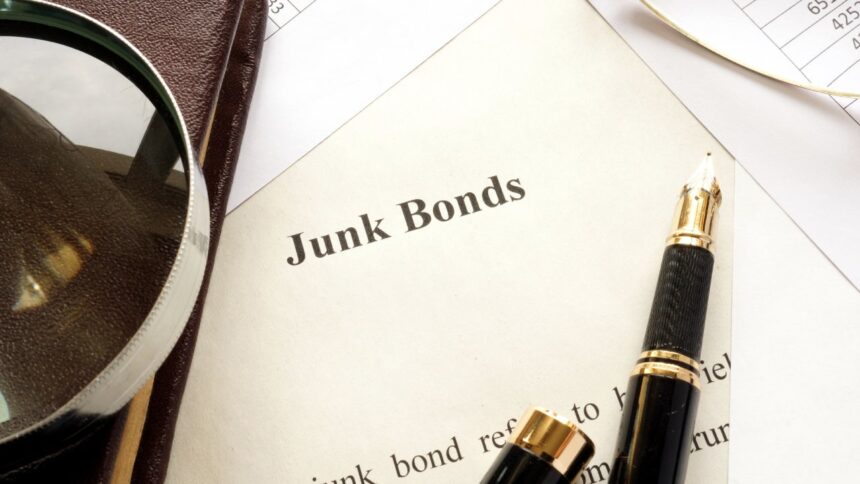Junk bonds are a high-risk funding, however they provide the potential for larger returns than investment-grade bonds. Junk bonds, also called high-yield bonds, are finest fitted to traders who’re prepared to tackle extra danger to be able to obtain larger returns.
Listed below are the important thing issues to find out about junk bonds and their execs and cons.
What are junk bonds?
Junk bonds are a type of bond or debt funding that’s rated beneath funding grade. The junk bond score means that there’s a higher danger that the issuer will default on the debt relative to investment-grade bonds. Because of this elevated danger, junk bonds provide a better rate of interest than investment-grade bonds, all else equal.
The standard of junk bonds can range markedly. Regardless of the identify, junk bonds could also be issued by corporations which might be in fairly good monetary form, although they’re typically issued by these in mediocre or poor form. The worst junk bonds are issued by corporations which might be struggling financially and have a excessive danger of defaulting or lacking their curiosity funds.
In distinction, investment-grade credit score scores are given to corporations which might be thought-about to be the least prone to default on their debt. These corporations are in a position to situation bonds which might be rated BBB as much as AAA on the Customary & Poor’s credit standing scale. Junk bonds, alternatively, are rated beneath BBB and carry what is taken into account the best danger of an organization lacking an curiosity cost (known as default danger). But corporations with junk bonds aren’t merely defaulting left and proper, and higher-rated junk bonds can carry out properly for traders when a part of a diversified bond portfolio.
So it’s necessary to know that not all junk bonds are the identical, even when a few of them are really fairly dangerous.
Junk bond scores
To be able to assist traders assess the danger related to every junk bond, scores businesses like S&P, Moody’s, Fitch and Morningstar DBRS have a longtime set of standards.
Every company makes use of completely different labels, however all of them normally comply with an identical sample. For instance, credit score scores in a “B” vary counsel that bonds have a better default danger in comparison with investment-grade bonds which might be within the “A” vary, however they technically aren’t the riskiest.
As you progress decrease on the size, scores which might be a “CCC” or “C” point out a better danger of default. A “D” score alerts that the bond might have already defaulted and the issuer was unable to pay the borrower again.
| Moody’s | S&P | Fitch | Morningstar DBRS |
|---|---|---|---|
| Supply: Company Finance Institute | |||
| Ba1 | BB+ | BB+ | BB (excessive) |
| Ba2 | BB | BB | BB |
| Ba3 | BB- | BB- | BB (low) |
| B1 | B+ | B+ | B (excessive) |
| B2 | B | B | B |
| B3 | B- | B- | B (low) |
| Caa1 | CCC+ | CCC+ | CCC (excessive) |
| Caa2 | CCC | CCC | CCC |
| Caa3 | CCC- | CCC- | CCC (low) |
| D | D | D | |
Methods to spend money on junk bonds
Junk bonds could be bought from a brokerage agency that buys and sells particular person bonds. Traders may purchase a diversified portfolio of bonds by means of a mutual fund or ETF. In actual fact, a number of mutual funds and exchange-traded funds are devoted to holdings of solely junk bonds.
For traders seeking to get into the junk bond recreation however who don’t trust in their very own choice course of, these funds provide a simple technique to get entry to junk bonds. You’ll get pleasure from the advantages of proudly owning a diversified portfolio of junk bonds — much less danger than proudly owning only a few junk bonds — and also you’ll doubtless get pleasure from a better yield than you’d with investment-grade bonds.
In case you’re shopping for a fund, have a look at its long-term efficiency to see what returns you may count on. To get a way of the fund’s volatility, examine efficiency in every year. You too can examine below the hood to see how a lot of the fund is invested in every credit score grade, providing you with an thought how dangerous the fund’s particular person bonds could also be. This attitude might help you establish whether or not a junk bond ETF might suit your wants.
Execs and cons of junk bonds
Junk bonds is usually a good technique to diversify your portfolio, however they’re not for everybody. Contemplate these execs and cons when deciding whether or not to take a position.
Execs
- Larger yields. Junk bonds are extra risky than different bonds, however you may count on to obtain larger rates of interest from them than their investment-grade counterparts.
- Money circulation. Junk bonds, like bonds usually, are a great way to supply constant money circulation to your portfolio. Bonds usually aren’t as risky as shares, so that you’re much less prone to expertise everlasting losses.
- Diversification. Bonds provide a technique to diversify your portfolio away from simply shares, and so they might carry out otherwise in several market environments, doubtlessly rising when shares fall.
Cons
- Default danger. Junk bonds are riskier than investment-grade bonds as a result of they’re issued by corporations which might be on much less steady monetary footing. They’ve larger default charges than investment-grade bonds.
- Liquidity. Junk bonds might not commerce as regularly as investment-grade bonds, that means you might need a more durable time promoting your bonds instantly or with out taking a extra substantial low cost in the marketplace value.
- Threat of particular person bonds. Investing in particular person junk bonds requires you to investigate the corporate, making investing in them riskier than merely shopping for a fund with a diversified assortment of junk bonds.
Backside line
Investing in particular person junk bonds most likely gained’t enchantment to the typical individual, however a junk bond fund can work for a lot of traders, providing diversified publicity. Even nonetheless, earlier than investing in junk bonds, it’s necessary to know the dangers and weigh them in opposition to the potential advantages.
— Bankrate’s Logan Jacoby contributed to an replace of this text.











